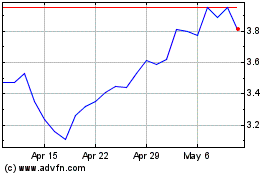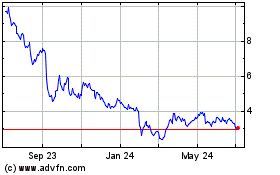Market Bubbles, Recession or Economic Rebound?
January 30 2008 - 2:01PM
Business Wire
Three of the world�s preeminent economists will dissect the causes
and effects of volatility and instability in the global economy and
in credit, housing and oil markets, and the resulting outlook for
business, consumers and financial markets at the coming Cambridge
Energy Research Associates CERAWeek 2008 conference, beginning
February 12 at the Westin Galleria Hotel in Houston. Making
presentations at CERAWeek will be: Dr. Alan Greenspan, Chairman,
U.S. Federal Reserve (1987-2006) � Keynote Dinner Address, 6:30
p.m., Thursday, February 14. Kenneth Rogoff, Professor of Public
Policy and Professor of Economics, Harvard University, former
chairman of International Monetary Fund � Special Address, Energy
and the Economy, 3:00 p.m., Tuesday, February 12. Robert Shiller,
Professor of Economics, Yale University and author of Irrational
Exuberance - �Bubbles, Cycles & the Global Economy�
(invitation-only presentation), Monday, February 11. �CERAWeek is
about more than just energy,� said CERA Chairman and IHS Executive
Vice President Daniel Yergin. �The energy industry and financial
thought leaders attending CERAWeek will have access to a depth and
range of experience, expertise, perspectives and analysis on the
global economy that will provide a strong framework for assessing
future economic prospects and their impact on energy markets.
�These speakers� understanding and previous observations on the
fundamentals and current trends in the energy, housing and credit
markets reveal a foresight and forthrightness that are of high
value to decision makers grappling with the hard alternatives
presented in today�s challenging environment,� Yergin said. Robert
Shiller �I think there are clouds on the (economic) horizon. The
dominant theme right now is the housing boom, and secondly the high
oil prices which have traditionally been a precursor of a
recession.� (Bloomberg, August 19, 2006) In the extreme scenario,
buyers start to default on adjustable-rate mortgages and trigger a
financial crisis in the banking sector. Real estate prices nosedive
as properties are abandoned. If this is compounded by significantly
higher oil prices, "it could change the psychology," says Shiller.
"Consumer confidence plummets and people pull back on spending."
This causes a downward economic spiral and leads to recession. (Fox
News, August 24, 2005) "Perhaps we have gotten a little too
confident in the global economic growth. The problem is high oil,
stock and real estate prices. I believe that a substantial part is
speculative bubble thinking. We have gotten too confident of the
prices in these markets." (Dubai International Financial Centre
(DIFC) Opening, November 18, 2007) Dr. Shiller is also the author
of The New Financial Order. Dr. Alan Greenspan The balance of world
oil supply and demand "has become so precarious that even small
acts of sabotage or local insurrection have a significant impact on
oil prices." And, he added, while the U.S. economy "has been able
to absorb the huge implicit tax of rising oil prices so far� recent
data indicate we may finally be experiencing some impact."
(Testimony to Senate Foreign Relations Committee, June 8, 2006, as
reported in The Washington Post) �The experiences of the past 50
years � and indeed much longer than that � affirms that market
forces will play a key role in conserving scarce energy resources,
directing those resources to their most highly valued uses.
Market-driven improvements in technology and shifts in the
structure of economic activity are reducing the intensity of the
world�s oil use, and recent oil price increases will presumably
hasten the displacement of oil-intensive production facilities.�
(The Age of Turbulence, 2007) Kenneth Rogoff ��Energy independence�
(is) a dangerous fallacy. In today�s globalized world, diversity of
supply is a better concept.� (Speech to the UN General Assembly,
October 9, 2006) �(I)f the United States does not experience a
significant and protracted growth slowdown, it should either be
considered very lucky or even more �special� than most optimistic
theories suggest. Indeed, given the severity of most crisis
indicators in the run-up to its 2007 financial crisis, the United
States should consider itself quite fortunate if its downturn ends
up being a relatively short and mild one.� (Paper titled Is the
2007 U.S. Sub-Prime Financial Crisis So Different? An International
Historical Comparison, presented to the American Economic
Association�s annual meeting, January 14, 2008) �Unfortunately, we
live in an era where trend U.S. productivity growth is down and the
housing bubble could be deflating for years. We are no longer in
the technology boom years of the 1990s Greenspan era. No matter how
much the Fed steps on the gas pedal, it is going to be hard to keep
U.S. trend growth much above the two percent levels Europeans and
Japanese have come to think of as normal. With baseline growth
lower than it was 10 years ago, it takes less to push the economy
into recession.� (Financial Times, December 18, 2007) Registration
CERAWeek will be held from February 11-15, 2008 at the Westin
Galleria hotel in Houston. Further information and delegate
registration is available at www.ceraweek.com. The latest
conference information, including agenda and speaker updates, is
available at the conference website. Media may register or obtain
additional information by contacting Bethany Genier, 617-866-5142,
or e-mailing bgenier@cera.com. About CERA (www.cera.com) Cambridge
Energy Research Associates (CERA), an IHS company (NYSE: IHS), is a
leading advisor to energy companies, consumers, financial
institutions, technology providers, and governments. CERA
(www.cera.com) delivers strategic knowledge and independent
analysis on energy markets, geopolitics, industry trends, and
strategy. CERA is based in Cambridge, Massachusetts, and has
offices in Beijing, Calgary, Houston, Mexico City, Moscow, Paris,
Rio de Janeiro, San Francisco and Washington, D.C. About IHS
(www.ihs.com) IHS (NYSE: IHS) is a leading global source of
critical information and insight for customers in a broad range of
industries. Our customer product and service solutions span four
major areas of information: energy, product lifecycle management,
environmental and security. By focusing on our customers first, we
deliver data and expertise that enable innovative and successful
decision-making. Customers range from governments and multinational
companies to smaller companies and technical professionals in more
than 180 countries. IHS has been in business since 1959 and employs
more than 3,000 people in 35 locations around the world. IHS is a
registered trademark of IHS Inc. All other company and product
names may be trademarks of their respective owners. Copyright �
2008 IHS Inc. All rights reserved.
IHS (NYSE:IHS)
Historical Stock Chart
From Jun 2024 to Jul 2024

IHS (NYSE:IHS)
Historical Stock Chart
From Jul 2023 to Jul 2024
